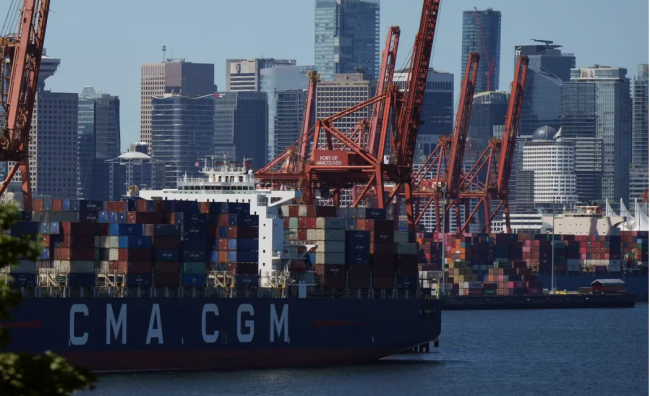Articles Menu

Aug. 30, 2023
An important point that some of us have overlooked: Canada will come under increasing pressure to market fossil fuels to other nations to balance our trade accounts!!!
- Gene (Vancouver Ecosocialists)
In Canada, which is heavily trade-dependent, free trade has been popular for several decades. For Conservative or Liberal governments, inking a new pact was reflexively hailed as a big achievement.
In other nations, it was much the same. In keeping with the globalization drive, economic elites sought and supported highly liberalized trade agreements.
But no longer. The trend has been upended by the trade-war populism of Donald Trump, Joe Biden’s nationalist industrial policy (which maintained Mr. Trump’s tariffs on China), technological change, and the pandemic’s impact on supply chains.
The free trade era is gone, and with it, a big Canadian advantage. Gordon Ritchie, a principal negotiator of our free trade agreement with the United States, doesn’t mince his words on the impact: “Absolutely and unequivocally bad,” he said in an interview. “It’s a terrible thing for Canada.”
The country faces a potentially shrinking market in the U.S., China, and in other markets owing to protectionist headwinds. Dating back all the way to the Second World War, Mr. Ritchie noted, we have had the benefit of a trade liberalization policy orientation, especially in Washington. “Now with both parties, Republicans and Democrats, playing hardball with us, all bets are off … We are brutally exposed to the vagaries of U.S. protectionism.”
Some might have noticed headlines a month or so ago declaring that Mexico has surpassed China as the U.S.’s top trade partner. That distinction used to belong to Canada. It was a boasting point for decades.
With Mr. Biden’s industrial policy “we have a real problem,” noted Mr. Ritchie. A side effect of the billions in clean energy subsidies via his Inflation Reduction Act is the incredible payouts of up to $30-billion Ottawa and the Ontario government had to make to foreign automakers to manufacture electric vehicle batteries here.
“Look at the Stellantis and Volkswagen deals and at that bubbly little guy [Industry Minister François-Philippe Champagne] jumping up and down and saying ‘we have not had a major automotive investment like this in 35 years.’”
“Well, I did the last one, and we didn’t put out $30-billion. We offered them access to our market. No, this is madness.”
Madness or not, we have no choice but to play ball, said Thomas d’Aquino, the long-time expert on bilateral economics. The protectionist trend is indeed a terrible turn, but since “Canada is joined at the hip with the United States, we must pursue a policy of conscious parallelism when it comes to trade and industrial policy.”
The only option, he said in an e-mail, is to fight for a more secure place under the American umbrella.
Doesn’t the refurbished NAFTA Ottawa signed with the Trump administration in 2018 provide trade security? “You’re surely joking,” said Mr. Ritchie, pointing to how the Americans, who used to be more mindful of the rules, have repeatedly scorned them on files such as softwood lumber. Their attitude, he said, can be seen in their push to “emasculate the World Trade Organization.”
The Trudeau government was able to prevent Mr. Trump from blowing up NAFTA. “A successful act of survival,” Mr. Ritchie noted. It also won a concession with the Biden administration’s decision to make Canadian-assembled electric vehicles eligible for U.S. tax credits.
The securing of a free trade agreement with the European Union and a trade accord with the U.K. were good steps. But the amounts of trade involved, Mr. Ritchie said, don’t begin to counterbalance what’s happening with the U.S. and China.
It was the impact of NAFTA on the American worker, in his view, that was the main culprit in souring public attitudes toward free trade. In retrospect, critics like Ross Perot were right. “It was viciously anti-labour and resulted in massive job losses in the rust belt,” said Mr. Ritchie. As for the free trade agreement, Mr. Ritchie maintains it did “a hell of a good job. But alas, like plutonium, it has a half life.”
Where to turn now? In the new protectionist era, he said the critical element, even more so than in prior times, will be for Canada to aggressively exploit its comparative advantage in the extraction and harvesting of natural resources.
This is our prosperity engine, but the alarm over the climate crisis, while “completely justified,” is preventing it from functioning, said Mr. Ritchie. That crisis must be addressed. But given that Canadian emissions are relatively small in the global scheme of things, remedies can’t come at the expense of “turning off the engine.” If they do, our standards of living could shrink like trade markets.
[Top photo: Gantry cranes sit idle as a container ship is docked at the Port of Vancouver on July 19.DARRYL DYCK/THE CANADIAN PRESS]